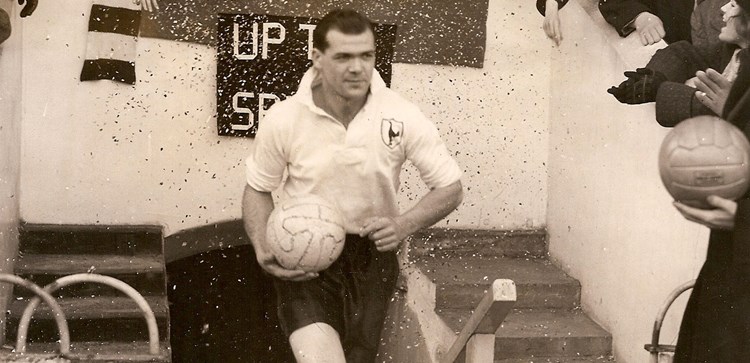
Remembering the Duke of Tottenham, 70 years after his title-winning strike
Wed 28 April 2021, 12:13|
Tottenham Hotspur
When we won our first Division One title in 1951, centre-forward Len Duquemin scored 14 goals. But it was the last of them – at home to Sheffield Wednesday on 28 April, 1951, 70 years ago today – that started the celebrations.
In what was our penultimate game of the campaign, and with Manchester United snapping at our heels, we faced a tough Owls team that was battling against relegation. It was a fight they would ultimately lose on goal difference.
A crowd of 46,645 packed into White Hart Lane on that Saturday hoping that we would finish the job ahead of Liverpool’s visit the following week. And they went through agony before the famous ‘Tottenham Roar’ rang out after the Duke’s first-half goal proved enough.
Seventy years ago, and just about seven decades after we’d been playing on Tottenham Marshes, visionary former Spurs player Arthur Rowe had steered us to the ultimate dream.
Chances were few as Wednesday fought all the way but when Duquemin’s opportunity arose he seized it with customary precision. We now had three points more than United with both sides having one game left.
As team mate Eddie Baily recalled: “Reliable Len we used to call him because, when all the other forwards were off the mark, it was usually old Len who saved our faces.”

Eddie himself scored 12 times that season with winger Sonny Walters top scoring on 15 on our way to a league total of 82.
And what was even more important to Rowe and his troops was our memorable ‘Push and Run’ style of play. Indeed, when Football League president Arthur Drewry presented our skipper Ron Burgess with the trophy he said: “I not only congratulate Spurs on having won it but also on the manner in which they did so.”
Centre-forward Len was more generally known as the “Quiet Man” because he just got on with the job. He was a powerful strong runner with a great eye for goal, but it was his enthusiasm and 100 per cent effort that made him the darling of the terraces. They knew that he shared their love for the club.
Born on the island of Guernsey, Len worked as a gardener in a monastery during the German occupation where he became fluent in French. He was recommended to Spurs by a supporter on the island and travelled to London for a trial in December, 1945, at the age of 21.
He was immediately taken on, signed as an amateur the following month and turned fully professional at the end of the season following ‘guest’ spells with Chelmsford City and Colchester United. Rowe was then manager at the former.
The Duke’s special relationship with the Spurs fans was initially borne out of tragedy. In September, 1946, his brother Frank was drowned when washed overboard on his way to watch Len play in a reserve game at the Lane. Frank had come through the war unscathed while serving with the RAF, but he was one of two people that died when the ferry hit gale-force conditions.
His body was never recovered.
Len was informed by the Spurs management when he arrived at the Lane and offered the opportunity to return home. But he insisted on playing saying that was what Frank would have wanted him to do.
The tragic news also reached the Spurs crowd who gave Len a wonderful reception when he took to the field – and that day’s demonstration of commitment and devotion was never forgotten. Typically, the Duke scored the winner in a 2-1 win over Birmingham City Reserves.

Len also scored when he and Johnny Jordan were given their senior debuts by manager Joe Hulme in a Division Two match at home to Wednesday early in the 1947/48 season. Jordan hit two in a 5-1 win and when Rowe took over and led us to promotion in 1950, Duquemin’s eye for goal was crucial.
His keen appetite, effort and willingness to put his head in where the boots were flying always lifted the fans. He was designed for that era’s game being strong, brave and mobile. And he kept things simple by looking to receive the ball with his back to goal, laying it out wide and then racing in to compete for the expectant cross.
Len further endeared himself to our supporters when he played on the day of his wedding in March, 1953. Not that unusual in those days but he and June, a Tottenham girl, were filmed by Pathe News at the local church before a police escort – namely a single copper on a white horse – led the wedding limo through the crowds at the Lane.
The Duke was then featured in the dressing room, undoing his tie with his jacket hanging behind him with its white carnation to the fore on the lapel! When Len led the team out of the tunnel the fans above the entrance showered him with confetti!

Unfortunately, we lost 3-2 to Chelsea – a result that proved enough to save the Blues from relegation.
With a goals record per game of 44 per cent, he went on to score 134 league and cup goals for us and, although he came under pressure for his place from Dave Dunmore and Alfie Stokes, he saw off both those challenges before the great Bobby Smith finally took over the role as the regular Spurs spearhead.
Len moved into non-league football and later ran a newsagent’s shop in Northumberland Park before taking over as landlord of the Haunch of Venison pub in Cheshunt, not far from our old training ground. He continued to live locally and was a regular spectator at our games in later life.
Sadly, he died in April, 2003, at the age of 78. On his day he had been exceptional, but it was his love of Spurs and determination to do it for the fans that made him special.
By John Fennelly














































